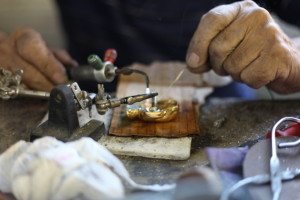America’s favorite nonagenarian may be Betty White, but in the boxing world one man has stepped into the ring to challenge this title. Ardash Sahaghian, the originator of the modern boxing belt, lives a life away from the spotlight and is unknown to most of the boxing world and fans. On Nov. 8, Sahaghian will finally be inducted into the New Jersey Boxing Hall of Fame, after over 30 years of silent contribution.

Humble beginnings
Born in Romania to a family that escaped the Armenian Genocide, Sahaghian worked various odd jobs when he was younger—from grocery store clerk to cobbler—until he became a trained jeweler, following in his brother’s footsteps. Because of the communist policies, the brothers got in trouble when a watchmaker revealed to the authorities that “Sahaghian” was the owner of the gold used to fashion the watch parts. Ardash took full responsibility for his brother’s jewelry business, as his brother was newly married and frail. He was subsequently arrested, tortured, and imprisoned. His mother, upon witnessing the interrogation and torture, died of anxiety and trauma. The decision to leave for America was not a very difficult one, he says.
The journey took Sahaghian and his wife, Nazeli, to various countries, including Brazil and South Africa. In South Africa, Sahaghian served as the foreman of a factory, and despite the rampant racism and apartheid at the time, treated his black employees as his equals—even driving them home and going to their bars. “It’s his MO,” his grandson, Edward Majian, proudly states. “For him, it was always nothing more than just getting the job done and treating everyone with fairness and respect,” he continues.
From 1975 until the early 1980’s, the boxing belts began to take on their final designs. Sahaghian’s skills as a craftsman jeweler were vital to creating such detailed, intricate pieces. Despite his success in this field, the process of transitioning from a jeweler to a boxing belt designer was unexpected and quite sudden for the inventor.
Transition to designing
Once in the United States, Sahaghian worked in a tool and dye factory, but a serious injury left him incapacitated and unable to walk for months. After a slow recovery, he sought a job that would allow him to work on a jewelry bench. He happened upon a jewelry designer named Philip Valentino, Sr., who was impressed with Sahaghian’s ability to create filigree pieces, as well as to design his own creations, which were sold to companies such as Tiffany and Co.
Valentino, an avid boxing enthusiast, invited Sahaghian in the late 1970’s to redesign old boxing belts and create completely new designs for the up-and-coming boxing organizations. “It was the work of this period that ultimately became, and remains, the industry image to this day,” explains Majian. With the exception of the WBC, every organization at the time used the belts that Sahaghian created at Valentino’s fabrication shop in New Jersey.

“Looking back, I see that it was a natural change for me. It fit,” Sahaghian tells the Weekly. “These belts are like big pieces of intricate jewelry, or sculptures. It was not such a big change for me, just bigger than what I did. And I see that it was what I needed. They became my biggest creations.”
“I worked with small jewelry all my life. Of course, when [Valentino] invited me to create big designs, I said I could do it. I was used to working small—working big was easy for me. So, I accepted his invitation and got to work,” he adds.
Sartonk Designs
Four years ago, Majian founded “Sartonk” Designs (derived from the Armenian “zartonk,” meaning “renaissance”), continuing the tradition of designing belts that have adorned virtually every world champion since 1976, including Muhammad Ali, Mike Tyson, and Arthur Abraham, and in order to deter the plagiarizers that had been calling Sahaghian’s work their own for decades. “Up until four years ago, no one really knew who made the belts, so I founded the company to preserve my grandfather’s legacy,” Majian explains.
“Sartonk’s mission is to restore the dignity of getting a boxing belt. It is not sold to the public, as everything is made specifically for the men and women in the ring. We’ve tried to use Sartonk as a vehicle for having a positive influence on peoples’ lives, which drives us to do more.” The company offers the Ali-King Award, named after Muhammad Ali and Martin Luther King, Jr., to “promote writing and critical thinking skills in young boxers,” says Hasmig Tatiossian, Sartonk’s executive manager and director of community affairs.
Sahaghian’s designs are used by most major boxing organizations worldwide, such as the World Boxing Association (WBA), the International Boxing Federation (IBF), and the World Boxing Organization (WBO).

His advice to young aspiring Armenians of the next generation is to ”do what you love to do, and do it for that reason. Don’t worry too much about recognition or not getting recognition. There were many times when I didn’t think anyone would ever know—that my work might be lost, but that did not stop me from creating. And, in the end, you never know.”
Internationally recognized boxing referee and International Boxing Hall of Fame inductee Joe Cortez expressed his excitement at Sahaghian’s long-awaited induction. “I’m happy he’s finally inducted. He’s one of the individuals who should have been inducted years ago. He’s a master, creator, and legend. Without him, we wouldn’t have these belts,” he said. “In my heart, he’s a people’s champion, a champion of the champions.”
For more information about Sartonk Designs, visit www.facebook.com/sartonk or www.twitter.com/sartonk.


Be the first to comment